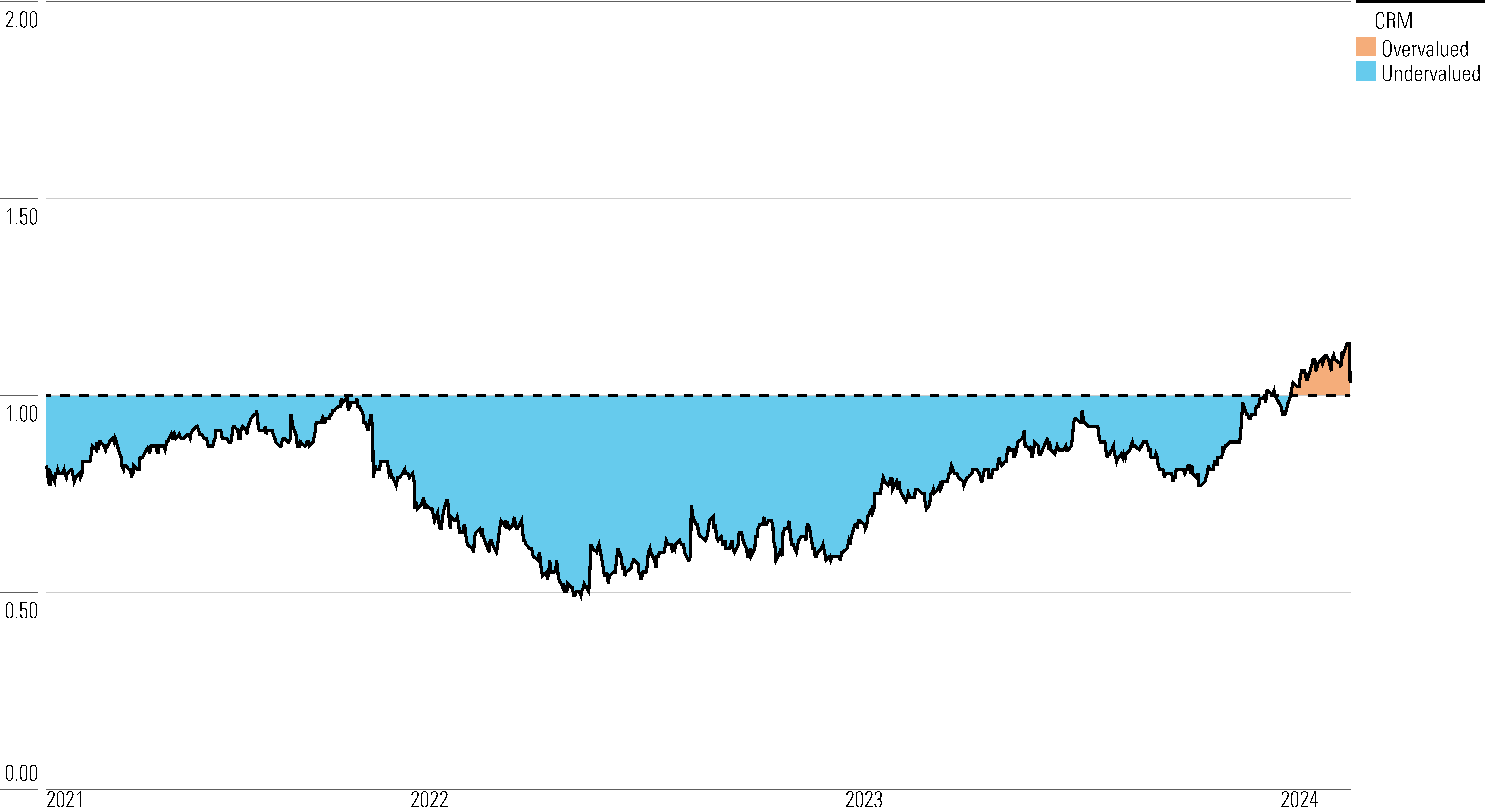After Earnings, Is Salesforce Stock a Buy, a Sell, or Fairly Valued?
With continued positive performance and a new dividend, here’s what we think of Salesforce stock.

Salesforce CRM released its fourth-quarter earnings report on Feb. 28. With Salesforce’s stock price up 90% over the past year, here’s Morningstar’s take on the company’s earnings and the outlook for its stock.
Key Morningstar Metrics for Salesforce
- Fair Value Estimate: $300.00
- Morningstar Rating: 3-stars
- Morningstar Economic Moat Rating: Wide
- Morningstar Uncertainty Rating: High
What We Thought of Salesforce’s Q4 Earnings
- Salesforce continues to perform well in a tight demand environment, with upside versus our expectations on both the top and bottom lines for its fiscal fourth quarter. Guidance was mixed, with revenue slightly worse than we expected, while earnings per share was slightly better.
- The biggest headline is the evolution of Salesforce’s capital allocation strategy, with its buyback program expanded by another $10 billion and the establishment of a $0.40 quarterly dividend. Management was enthusiastic in its discussion of everything artificial intelligence, which we think will be an area of strength, with the firm’s Einstein 1 Platform already generating revenue. Based on the continued quarterly upside and new guidance, we are raising our midterm profitability estimates and lifting our fair value estimate to $300 per share from $265. We see the stock as fairly valued.
- Fourth-quarter revenue grew 11% year over year (10% in constant currency) to $9.29 billion, versus the high end of guidance of $9.23 billion. As in the last several quarters, strength was driven by MuleSoft, Data Cloud, and solid execution. The remaining performance obligation grew 13% year over year in constant currency, outpacing revenue growth for the second consecutive quarter. Professional services remain pressured and declined 9% year over year—based on difficult comparisons and customers taking on smaller projects—and missed our estimates. Multi-cloud deals were strong, with eight of the top 10 deals and more than half of the 100 largest deals involving six or more clouds.
- While profitability remains a bright spot, we continue to see a path for margins to expand even as the firm invests in near-term AI innovation. The non-GAAP operating margin was 31.4%, versus 29.2% a year ago. Major restructuring actions from January 2023 continue to boost margins, but the internal cultural shift remains apparent, and we expect operational efficiencies and pricing to serve as tailwinds to margins over the next couple of years.
- Management repeatedly noted strong client interest in AI and Data Cloud. On a year-over-year and constant-currency basis, Sales Cloud grew 10%, Service Cloud grew 12%, Platform (which includes Slack) grew 10%, Marketing and Commerce Cloud grew 7%, and Data Cloud surged 21%. Relative to our model, Data Cloud was notably ahead, with some upside in Service Cloud, while Marketing and Commerce Cloud was slightly light, and Sales Cloud and the Salesforce Platform were approximately in line. From an industry vertical perspective, the public sector and travel and hospitality were solid, while retail, consumer goods, and high tech remained more challenging. Revenue growth in the Americas was 9%, Europe was 11%, and Asia-Pacific was 19%, all on a constant currency and year-over-year basis. Churn ticked up a bit sequentially to slightly more than 8%.
- While management characterized the demand environment as unchanged, we continued to see small signs of improvement. We think revenue guidance has a conservative bias, which is hard to find fault with. Between guidance for the first quarter and the full year, we see an implied deceleration based on lower bookings from the depths of the last five or six quarters. The outlook for profitability was slightly better than we anticipated. The first-quarter outlook calls for $9.12 billion-$9.17 billion in revenue and $2.37-$2.39 in non-GAAP EPS. For fiscal 2025, management expects revenue of $37.7 billion to $38.0 billion, a non-GAAP operating margin of approximately 32.5%, and non-GAAP EPS of $9.68-$9.76
Salesforce Stock Price
Fair Value Estimate for Salesforce
With its 3-star rating, we believe Salesforce stock is fairly valued compared with our long-term fair value estimate of $300.
We model a five-year compound annual growth rate for total revenue of 10% through fiscal 2029, which we think will be driven by solid growth in all clouds, with the most notable strength coming from Data Cloud. Our revenue forecast assumes modest revenue acceleration after depressed growth in both fiscal 2023 and 2024. We forecast non-GAAP operating margin to expand from 31% in fiscal 2024 (actual) to the mid-30% range in fiscal 2029, which we think is consistent with management’s new profitability focus.
According to management, the total addressable market will grow to $248 billion by 2025, with compound annual growth rates of 10%-15% for areas served by Salesforce’s various clouds. In our view, the company will benefit from the natural cross-selling of solutions among the clouds. To help support a decade of strong growth, we model several hundred million dollars of annual bolt-on acquisitions after a strategic shift away from inorganic growth.
Read more about Salesforce’s fair value estimate.
CRM PF

Economic Moat Rating
We assign Salesforce overall a wide moat arising primarily from switching costs, with support from a network effect. In our opinion, the strength of the company’s clouds is important but should not overshadow the importance of all the solutions Salesforce offers under one umbrella. We believe customers value its discrete clouds as stand-alone solutions, but they are highly complementary and integrated, making the complete more compelling. Customers are also looking to consolidate vendors. As the company offers a wider set of related and best-in-class solutions, we believe it becomes more deeply entrenched in its customers as they adopt multiple clouds.
Read more about Salesforce’s moat rating.
Risk and Uncertainty
We assign Salesforce a High Uncertainty Rating. We believe Marc Benioff would be difficult to replace as CEO, as he pioneered the software industry, co-founded the company, and led it to become a dominant force with a broad portfolio of sales and marketing solutions.
We believe the most important metric for investors is revenue growth. Therefore, continued deceleration in the Sales Cloud, or growth that does not materialize as expected in Service, Marketing, and Commerce Clouds, or the Salesforce Platform would likely harm the stock.
To help drive growth, Salesforce has also been acquisitive. While we do not believe its acquisitions have been transformative, the company has certainly executed some larger transactions to help establish an immediate or larger presence with a particular solution. Investors have been concerned at times about rich valuations and organic growth prospects, as was the case with the Slack, Tableau, and Mulesoft acquisitions over the last several years. We believe the company is likely to continue to make acquisitions but has pulled back from larger deals. In these situations, valuation and integration will remain risks.
Read more about Salesforce’s risk and uncertainty.
CRM Bulls Say
- Salesforce dominates the SFA space, but it still only controls 30% in a highly fragmented market that continues to grow by double digits each year, suggesting there is still room to run.
- The company has added legs to its overall growth story, including customer service, marketing automation, e-commerce, analytics, and artificial intelligence.
- Management is likely going to focus on expanding margins after years of subscale profitability.
CRM Bears Say
- As the company grows, it may be increasingly difficult for it to grow faster than its various end markets.
- Salesforce has entered new areas via acquisition and has arguably paid material premiums in the process. Integration risk is real, as is the risk of increasingly large, dilutive, or ill-conceived deals.
- Despite its size, Salesforce has generated substandard margins in recent years, and its renewed focus on profitability may negatively affect already-slowing growth.
This article was compiled by Frank Lee.
The author or authors do not own shares in any securities mentioned in this article. Find out about Morningstar’s editorial policies.


/cloudfront-us-east-1.images.arcpublishing.com/morningstar/347BSP2KJNBCLKVD7DGXSFLDLU.jpg)
/cloudfront-us-east-1.images.arcpublishing.com/morningstar/TP6GAISC4JE65KVOI3YEE34HGU.jpg)
/d10o6nnig0wrdw.cloudfront.net/04-29-2024/t_d0e8253d77de4af9ae68caf7e502e1bf_name_file_960x540_1600_v4_.jpg)